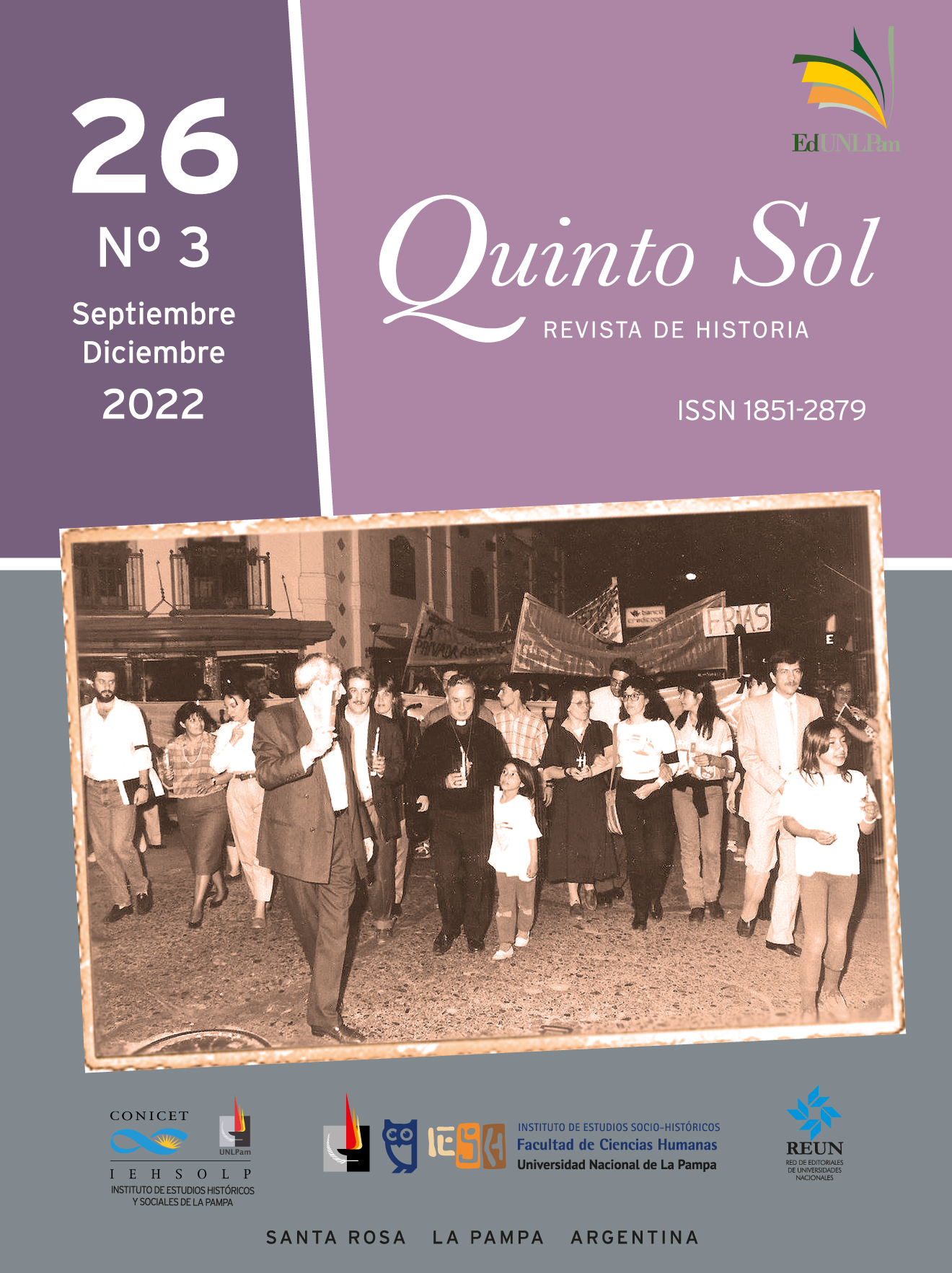Laity and clergy in the constitutional reforms of Catamarca (1965-1988)
DOI:
https://doi.org/10.19137/qs.v26i3.6894Keywords:
constitutional reform, clerical, laicAbstract
During the second half of the 20th century, Catamarca tried two constitutional reforms that expressed tendencies of each context, the first in 1965 and the second in 1988, and that were representative of its social framework. For this reason, we will place ourselves in the analysis of the reform projects and the texts sanctioned as provincial supreme law, taking into account the guidelines of said experiences: the liberal (secular) tendency and the clerical tendency.
Catamarca can be characterized as a space of a traditional nature, where the weight of the Catholic Church represents an inescapable factor in power relations, since its presence was decisive, a key actor at a time when the legal and political order of the provincial society was defined; to such an extent that it has a very solid power of challenge. This was demonstrated in the last constitutional reform, in 1988, when it managed to capture some of its principles in the Magna Carta and tried to make the provincial State a quasi-religious organization. In the reform of 1965, the position of the constituents had been different, since principles closer to a secular State prevailed, which generated angry criticism from the Church. In this article we will observe this dichotomy between laity and clergy, going through the relationship between political parties and the Catholic Church, which will allow us to reconstruct a scenario crossed by a broader debate regarding the modernization of the province that impregnated the constitutional norm; in addition to undressing joints of political crises that were a constant in the three decades after the first Peronism.
Downloads
References
Acuña, M. L. (1984). De Frondizi a Alfonsín: la tradición política del radicalismo (Vol. 2). Centro Editor de América Latina.
Aguirre, H., Calderón, M., Wlasiuk, J. (2003). Desempeño de Indicadores Socioeconómicos Seleccionados en Argentina, 1980–2001. Evaluación Nacional y Contexto Internacional. Documento de trabajo, 5. https://repositorio.uca.edu.ar/handle/123456789/2398
Altamirano, C. (2001). Bajo el signo de las masas 1943-1973. Biblioteca del pensamiento argentino. Volumen VI. Ariel.
Álvarez, G. (2016). El Catamarcazo. Protesta y Rebelión civil en la Catamarca de los 70. El trébol.
Alvero, L.; Ibáñez, C. H. (2011). Historia económica de Catamarca, 1810-2008. Secretaría de Extensión Universitaria, Editorial Universitaria-UNCa.
Ariza, J. (2009). Ciudadanía en un contexto de modernización periférica. Catamarca 1945-1955. [Tesis de Maestría. Universidad Nacional de Catamarca. Tesis no publicada].
Ariza, J. (2017, 9,10 y 11 de agosto). Una movilización popular y la minería como cuestión de Estado. La creación de YMAD, Catamarca 1958. [ponencia]. XVI Jornadas Interescuelas/Departamentos de Historia. Facultad de Humanidades. Universidad Nacional de Mar del Plata, Argentina.
Bazán, R. A. (2009). Historia contemporánea de Catamarca. Sarquis.
Bazán, R. A. (2010). Breve historia constitucional de Catamarca. En JHC. Historia y geografía de Catamarca. Homenaje al bicentenario de mayo. Volumen II. Sarquis.
Caro, R. (2010). Nuestro difícil derrotero político. En JHC. Historia y geografía de Catamarca. Homenaje al bicentenario de mayo. Volumen II., Sarquis.
Clark, M.R. Calas de y otros (2006). Historia de las letras en Catamarca. Dunken-Ediciones municipales
Coria, M. (1986) La convención constituyente de 1965. La reforma constitucional. [Seminario de Historia Argentina, Universidad Nacional de Catamarca. Facultad de Humanidades].
De la Orden, G.; Trettel, N. (2006). Tiempos contemporáneos. En Clark, M. R. Calas de y otros. Historia de las letras en Catamarca. Dunken.
Ferrari, M. y Mellado, V. (2016). La renovación peronista. Organización partidaria, liderazgos y dirigentes 1983-1991. Eduntref.
Jozami, G. (1978). Catamarca durante el gobierno de la UCRI (1958-1962). [Tesis de Licenciatura, Universidad Nacional de Catamarca. Tesis no publicada].
Mallimaci, F. (2008). Nacionalismo católico y cultura laica en Argentina. Los retos de la laicidad y la secularización en el mundo contemporáneo, 239-262. En Roberto Blancarte (coordinador), Los retos de la laicidad y la secularización en el mundo contemporáneo, El Colegio de México.
Plotkin, M.B. (2012). Argentina. La búsqueda de la democracia. En Gelman, J. Argentina. Tomo 5 1960/2000. Fundación MAPFRE/Taurus.
Rojas, F.; Medina, L. (2002) Gobierno de Armando Navarro (1963-1966) [Seminario de Licenciatura. Universidad Nacional de Catamarca. Tesis no publicada].
Sarlo, B. (2001). La batalla de las ideas (1943-1973). Ariel.
Scribano, A. (2005). Itinerarios de la protesta y del conflicto social, Centro de Estudios Avanzados, UNC.
Sigal, S. (2002). Intelectuales y poder en Argentina: la década del sesenta, Siglo Veintiuno de Argentina.
Downloads
Published
Issue
Section
License
When submitting their contributions, authors must declare that they have the permission of the file or repository where the documents that are attached to the work were obtained, whatever their format (unpublished manuscripts, images, audiovisual files, etc.). Such permission authorizes their publication and reproduction, releasing the journal and its editors from any liability or claim from third parties.
Likewise, authors must adhere to the Creative Commons license called "Attribution - Non-Commercial CC BY-NC-SA", through which the author allows copying, reproducing, distributing, publicly communicating the work and generating derivative works, as long as the original author is properly quoted and acknowledged. It is not allowed, however, to use the work for commercial purposes. Authors may establish additional agreements for the non-exclusive distribution of the version of the paper published in the journal (for example, placing it in an institutional repository or publishing it in a book), with the acknowledgment of having been published first in this journal.
The publication of content in this journal does not imply any royalty or charge for taxpayers.
Quinto Sol adheres to the DORA (Declaration on Research Assessment) signed in San Francisco, California, on December 16, 2012, and to the Declaration of Mexico (Joint Declaration LATINDEX - REDALYC - CLACSO - IBICT).










4.png)
2.png)












_(2).png)


1.jpg)



1.jpg)





